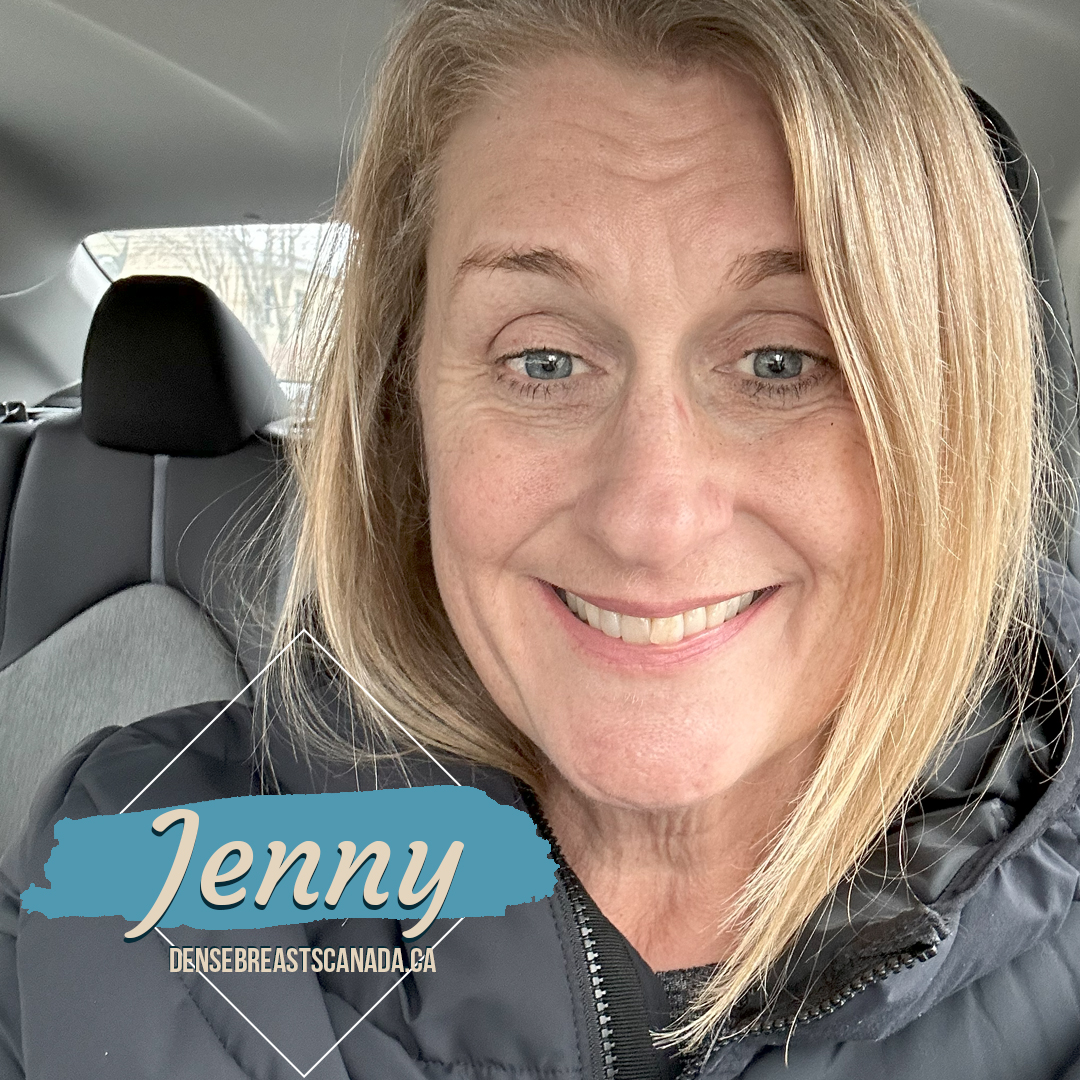Jenny

My breast cancer story is one of dense breasts and possibly a tumour developing in my late 40s. Up until May 19, 2023, I was considered not to have an increased risk for breast cancer, according to the Canadian Task Force guidelines; no family history, no genetic mutations, and no previous chest radiation and was treated accordingly by healthcare providers and me. I knew I had lumpy breasts but was not concerned about finding breast cancer. My focus was melanoma due to a family history. Surprise!
My most recent mammogram, in March 2023, and probably the one before it, in September 2020, did not pick up a malignant tumour or the DCIS noted in my surgical pathology report.
On April 24, 2023, I found the lump by self-checking one month after I received a letter from the screening program saying my results were “normal.” A very long fifteen days unfolded. Ultrasound, doctor’s call to confirm the diagnosis, a breast surgeon visit, and pre-op tasks filled my schedule.
After my initial visit to a breast surgeon and a surgical date set for June 13, I felt relief with the information and results explained to me. Then, because the lump was malignant and not detected on the mammogram, I had a breast MRI. So, the relief was short-lived because another mass was revealed – also not picked up on the mammogram(s). This delayed surgery by another three weeks as I sorted out what to do. In a very short time frame, less than 24 hours before the initially -scheduled surgery, I had to decide if I wanted a mastectomy the next day or delay surgery and get another biopsy. With much trepidation, I chose the biopsy and so began another long wait for results. Every second that ticked, I second-guessed my decision. Luckily, the second mass was identified as a non-cancerous fibroadenoma, and during the biopsy, the radiologist inserted a metal marker to locate the pesky lump in the future. Fortunately, they were able to send the results in six days.
A second lumpectomy date was scheduled and performed on July 6. I tolerated the surgery well and recovered without any challenges. Thus began a very long waiting period (for me, anyway!) to hear the surgical pathology results (Early Stage, T2N0sn) and be accepted into and contacted by the provincial cancer program. Finally in mid-September, once appointments were attended and further testing was completed, it was determined that I would not benefit from chemotherapy. My treatment plan includes taking a daily Aromatase Inhibitor, eight quarterly Zoledronic Acid Infusions, and 20 already-completed radiation sessions.
At this point, my terror has subsided somewhat, and my attention is directed toward advocacy, so I am sharing my story hoping to help others. In November 2023, during my radiation treatment period, I found the Dense Breasts Canada group on Facebook, which led me to their websites, and after reviewing the information, my cancer experience began to make sense to me. I believe that there is a possibility that cancer started developing in my late 40s and that dense C breasts interfered with the ability of the radiologist to identify the mass on mammogram imaging – the whole polar bear in a snowstorm analogy. Cancer and dense breast tissue both present as white on mammogram imaging and by the time you can feel a lump, it has likely been present for 2-5 years. Had I been equipped with the information I now know, I might have been able to have my “lumpy” breasts screened earlier with multiple modalities and treatment would have been even less invasive and costly. As a mother, a wife, a sister, a friend, and an educator, I will continue to use my voice because I am worth it, and so are you.
What I what you know…
Get your mammograms and, read the whole results letter, check to see if your density is reported. It should also tell you that mammograms are not perfect and will not detect everything. Mine did, and that kept me alert.
Read up and ask questions. Don’t be afraid to challenge your “team,” but also be sure to uplift and appreciate healthcare providers who demonstrate empathy and compassion.
Follow Dense Breasts Canada and their friends on social media and bookmark their website to review and refer back to regularly. Check out the ADVOCATE page for tips and scripts on approaching doctors about your wishes. Mybreastscreening.ca and knowyourlemons.org, and their app are invaluable resources.
Read the Canadian Task Force Guidelines. My mind was blown when I did. I did not know these guidelines existed, so I am telling everyone I know now. Hopefully, the updated guidelines presented in the spring of 2024 will include recommendations based on science and research by a team of breast health experts.
If you can, contact your MLA/MPP/MNA/MHA and advocate for additional screening for C & D density and the ability for people in their 40s to self-refer for mammograms. The additional ultrasound and MRI saved me from learning about my cancer at a later stage and enduring much harsher treatments.
Keep self-checking!
